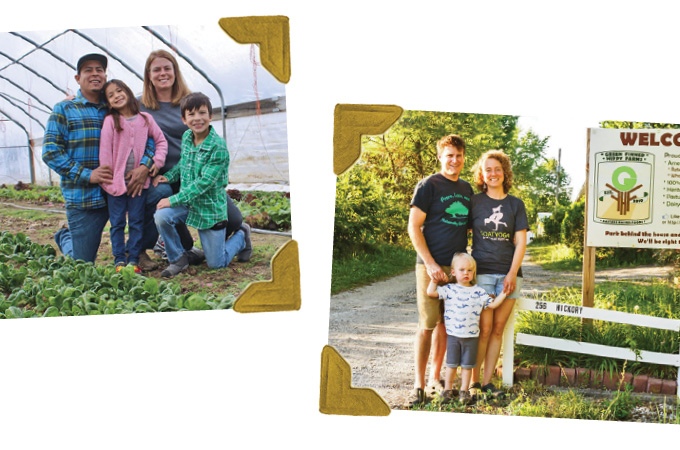From supporting local growers to getting fresh, healthy produce and meat, there are big benefits to eating and buying local, and the community-supported agriculture (CSA) model makes it easier than ever. We talked with a couple of local farmers about the perks of the program.
three rivers community farm
Amy Cloud is no stranger to traditional farming practices. She grew up on a dairy farm in Michigan, although she didn’t plan on taking up the trade professionally. “I studied English literature, but after college, I was introduced to sustainable farming techniques, and it opened my eyes to a whole new world,” she says. After interning at several farms, Cloud moved with her husband to Godfrey, Illinois, to manage one of the area’s first CSA programs. They were impressed by the benefits to both growers and consumers and noticed a need in surrounding communities. They decided to stay put and begin Three Rivers Community Farm in 2007.
“CSAs are a win-win,” Cloud says. “Members get a great deal on fresh, high-quality produce, and farmers mitigate some of their risk.” Traditionally, farmers lost profit when weather or natural disasters impacted their harvests. When joining a CSA, customers pay upfront for their share of what is grown that season. While there is some risk involved, Cloud notes it’s rare for something to go wrong. “You almost always get more value than what you put in,” she says, adding that the benefits go beyond just receiving food. “CSAs are one of the few ways consumers can connect directly with a farmer. They provide one-on-one interactions and form a tangible connection to the community.”
Three River Community Farm’s CSA operates for 24 weeks from mid-May to October. It has several pick-up locations in the St. Louis area, including the Schlafly and Tower Grove farmers’ markets, where nonmembers also can purchase produce. The CSA is currently full for the 2019 season, but anyone interested can join the waiting list online at threeriverscommunityfarm.com.
green finned hippy farm
Located in Pocahontas, Illinois, Green Finned Hippy Farm’s unique name comes from its history as a tilapia hatchery. While those finned friends are no longer around, owner Alicia Davis says the name stuck. The farm is now home to an endangered species: the American mulefoot hog. “They were popular but then fell out of favor with the rise of commercial farming,” Davis says. “Mulefoot hogs thrive outside, and you can’t really raise them indoors or in feedlots.”
The farm is dedicated to organic, ethically raised products. Its livestock includes hogs, chickens, cattle and goats. Davis says the pastures are rotated so the land can recover and grow new grass. “Around 10 acres of our land is always empty because it’s important for the health of the animals,” she notes. “Consumers don’t always realize how little they know about livestock treatment. Our doors are always open so people can see what they are buying and feel good about it.”
The farm offers a CSA for its eggs and pork that operates in three four-month seasons. The next will start in June, and Davis says people still can sign up. “The offerings are a little different each time, and sometimes our beef is included,” she explains, “It’s perfect if you’re a little adventurous and love cooking. Plus, you get to feel great knowing you are eating locally and supporting a local business.” She adds that the farm also is known for events like goat yoga. For more information, look for Green Finned Hippy Farm on Facebook or visit greenfinnedhippy.com.
more local CSAs
Fair Shares CCSA (combined CSA)
Shared Bounty Farm
Rosy Buck Farm
Winslow’s Farm
Danjo Farms
Pictured at top: Jose Lara and Amy Cloud with their children, Lydia and Diego; Alicia Davis with husband Josh and son Roland









